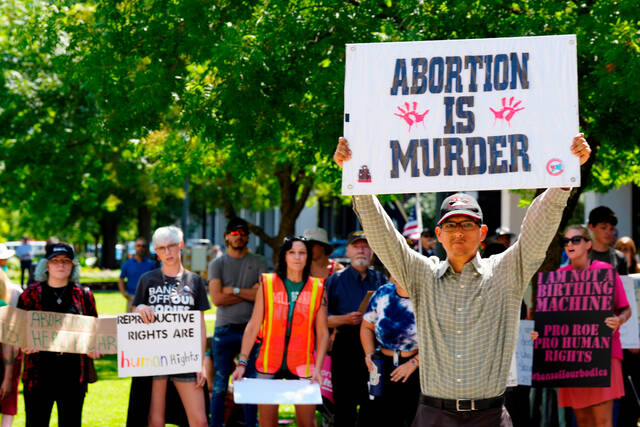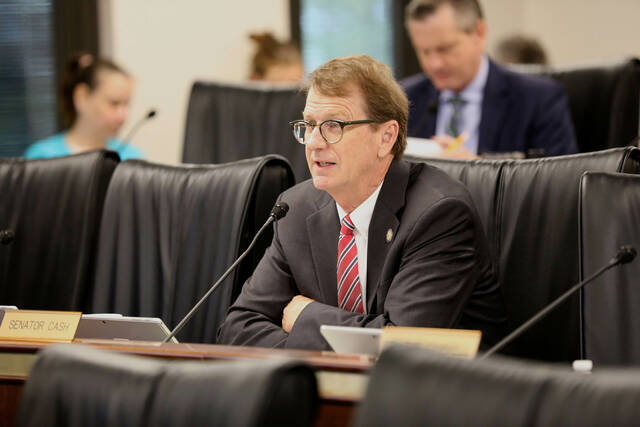COLUMBIA, S.C. — Sending women who get abortions to prison for decades. Outlawing IUDs. Sharply restricting in-vitro fertilization. These are the strictest abortion prohibitions and punishments in the nation being considered by South Carolina lawmakers, even as opponents of the procedure are divided over how far to go.
The bill faces a long legislative path and uncertain prospects, even if it clears the state Senate subcommittee that’s reviewing it.
But the measure up for a second hearing Tuesday would go further than any considered since the U.S. Supreme Court overturned Roe v. Wade in 2022, as abortion remains an unsettled issue in conservative states.
What’s in the bill
The proposal would ban all abortions unless the woman’s life is at risk and eliminates exceptions for rape and incest victims up to 12 weeks. Current law blocks abortions after cardiac activity is detected, which is typically six weeks into a pregnancy, before many women know they are pregnant.
The proposal would also go further than any other U.S. state. Women who get an abortion and anyone who helps them could face up to 30 years in prison. It appears to ban any contraception that prevents a fertilized egg from implanting. That would ban IUDs and could strictly limit in-vitro fertilization.
Providing information about abortions would be illegal, leaving doctors worried they couldn’t suggest legal abortion elsewhere.
OB-GYN Natalie Gregory said passing a bill like this would make so many discussions in her practice — from contraceptives to losing a pregnancy to in-vitro fertilization options — a “legal minefield” that could have her risking decades in prison.
“It constitutes a unconstitutional reach that threatens the very fabric of health care in our state,” she said during an eight-hour public hearing on the bill last month, adding that the proposal is both a waste of time and public money.
Abortion opponents are split over punishing women
The proposal has even split groups that oppose abortion and once celebrated together when South Carolina passed the six-week ban in 2021, a trigger law set to take effect if Roe v. Wade was overturned.
South Carolina Citizens for Life, one of the state’s largest and oldest opponents of abortion, issued a statement the day of last month’s hearing saying it can’t support the bill because women who get abortions are victims too and shouldn’t be punished.
On the other side, at least for this bill, are groups like Equal Protection South Carolina. “Abortion is murder and should be treated as such,” the group’s founder Mark Corral said.
Messaging of the past keeps abortion opponents apart
Mary Ziegler, a law professor at the University of California at Davis who has written extensively about abortion, said the divide stems from longstanding messaging that labeled abortion murder while avoiding punishment of women.
Ziegler refers to groups pushing for more penalties and restrictions as “abolitionists” and said their success in reshaping laws in conservative states, as well as shifting the broader political climate, has emboldened them to push ideas that don’t appear to have broad public support. They also have enough influence to get lawmakers to listen.
“It’s not going to go away. The trajectory keeps shifting and the abolitionists have more influence,” Ziegler said.
As the nation’s social and political discussions lurch to the right, with debates over whether same-sex marriage should be made illegal again or whether women should work outside the home, Ziegler said it has become easier to push for restrictions that might have never been brought before legislatures before.
“There is more breathing room for abolitionists now,” she said.
What could happen with the South Carolina Senate bill
A similar House bill last year got a public hearing but went no further. As the subcommittee met, Republican House leaders issued a statement that they were happy with the current state law and that bill went nowhere.
But things are less stable in the Senate, where nine of the 34 Republicans in the 46-member chamber were elected after the current law was passed. Three of them unseated the Senate’s only Republican women, a trio who called themselves the Sister Senators after helping block a stricter abortion ban after Roe v. Wade was overturned.
Republican Sen. Richard Cash, who sponsors the bill and is one of the Senate’s most strident voices against abortion, will run Tuesday’s subcommittee. He acknowledged problems last month with potentially banning contraception and restricting the advice doctors can give to patients. But he has not indicated what changes he or the rest of the subcommittee might support. Six of the nine members are Republicans.
GOP Senate leaders said there is no guarantee if the bill passes out of the subcommittee that it goes any further.
“I can say this definitively — there has been not only no decision made to bring up that bill, there’s been no discussion about bringing up that bill,” Senate Majority Leader Shane Massey said.











